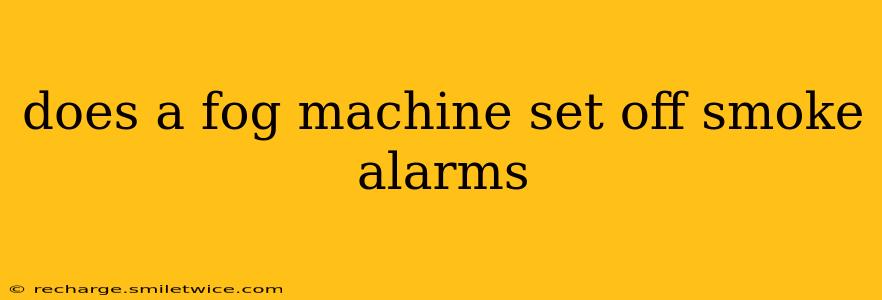The short answer is: it depends. While fog machines aren't designed to set off smoke alarms, several factors influence whether they will trigger the alarm. Understanding these factors can help you avoid unwanted alarms and ensure a safe and enjoyable event.
What's the Difference Between Fog and Smoke?
This is the key to understanding why sometimes fog machines trigger smoke alarms and sometimes they don't. Smoke alarms detect smoke particles, which are typically very small and often contain combustion byproducts. Fog machines, on the other hand, produce a water-based fog consisting of tiny water droplets suspended in the air. These droplets are significantly larger than smoke particles and generally don't contain the same chemical compounds.
So, Why Would a Fog Machine Set Off a Smoke Alarm?
Several factors can increase the likelihood of a fog machine triggering a smoke alarm:
1. The Type of Fog Machine and Fluid:
- Low-quality fog machines: Cheaper fog machines may produce a fog that contains more impurities or larger particles, increasing the chance of setting off an alarm. Higher-quality machines generally produce a finer, cleaner fog.
- Fog fluid composition: Some fog fluids might contain additives or impurities that could trigger a smoke alarm. Opt for high-quality, reputable fog fluids specifically designed for use in fog machines.
2. The Sensitivity of the Smoke Alarm:
Smoke alarms vary in their sensitivity. Older or less sensitive alarms might be less prone to triggering from fog, while newer, more sensitive alarms designed to detect smaller particles are more likely to react. The placement of the smoke alarm in relation to the fog machine also plays a role; proximity significantly increases the likelihood of triggering.
3. The Amount of Fog:
Overusing a fog machine or creating a very dense fog can overwhelm the alarm's sensors, potentially leading to a false alarm. Maintaining a moderate fog level is crucial.
4. The Type of Smoke Alarm:
- Photoelectric smoke alarms: These are more likely to be triggered by fog because they detect changes in light scattering caused by particles in the air.
- Ionization smoke alarms: These are generally less sensitive to fog because they detect changes in air ionization caused by combustion. However, a very dense fog could still potentially cause a false alarm.
How to Minimize the Risk of False Alarms:
- Test your smoke alarms: Ensure your smoke alarms are functioning correctly before using a fog machine.
- Use high-quality fog machines and fluids: Invest in reputable brands to minimize the risk of impurities.
- Avoid excessive fog: Keep the fog level moderate to prevent overwhelming the alarm sensors.
- Proper ventilation: Ensure adequate ventilation in the space to help disperse the fog quickly.
- Temporary alarm disablement (Proceed with Caution): As a last resort, and only if absolutely necessary, consider temporarily disabling smoke alarms during fog machine use. However, this is strongly discouraged unless absolutely necessary and only for a short duration. Always ensure someone is monitoring the fog machine and the area closely.
What if my fog machine keeps setting off smoke alarms?
If you consistently experience false alarms despite taking precautions, consider the following:
- Check your fog machine for malfunctions: A faulty fog machine might produce a fog that is too dense or contains more impurities.
- Replace your smoke alarms: Older or faulty smoke alarms might be overly sensitive.
- Contact a professional: If the issue persists, consult an electrician or fire safety professional for assistance.
In conclusion, while a fog machine might not always set off a smoke alarm, the possibility exists. By understanding the factors involved and taking the necessary precautions, you can significantly reduce the risk of false alarms and enjoy a safe and successful event. Remember, prioritizing safety is always paramount.
